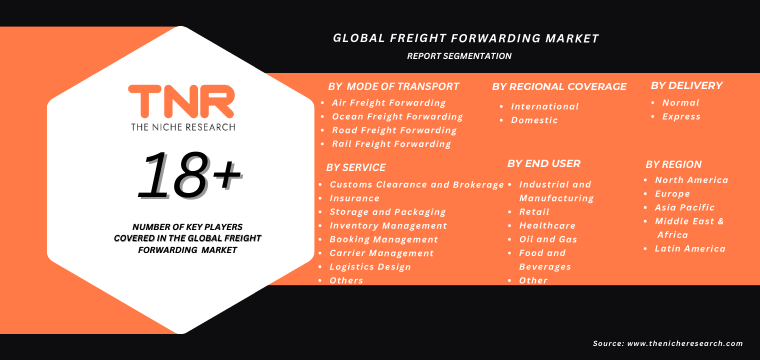In an era marked by increasing globalization and the relentless flow of goods across borders, the role of freight forwarding has become paramount. Freight forwarding is a critical service within the logistics and supply chain industry. It involves the coordination and management of the shipment of goods from one place to another, typically across international borders. Freight forwarders serve as intermediaries or facilitators between shippers (those who need to transport goods) and various transportation service providers, including shipping lines, airlines, trucking companies, and customs authorities.
Automation of manual operations has become one of the key drivers for the growth across all industries and freight forwarding market is no exception. The growth and expansion of the digital freight forwarding sector are being aided by the spread of e-commerce and the increase in free trade agreements. Advancement in technology is pushing boundaries and changing the way the world does freight forwarding. The shipping and logistics sector is always changing, and freight forwarders and shippers are constantly coming up with innovative strategies to adapt. Current business models have changed and continue to adapt to such advancements, and a number of technologies have played major roles in enhancing the logistics sector. For instance, Maersk developed Maersk Spot Booking, an online goods booking platform. Furthermore, Maersk’s Twill is another example of digital freight forwarding that allows for online cargo scheduling, tracking, and administration.
Moving forward, in recent years, there has been a surge in demand for environmentally friendly products and services. According to a 2022 survey issued by Simon Kucher & Partners, 71% of worldwide consumers are shifting towards purchasing items and adopting lifestyle choices that favour sustainability. The freight forwarding market is a crucial player in the global effort to reduce emissions. Recycling and reusing containers as much as possible is an example from the freight forwarding sector. Though this has been done for decades, current advances in communication and information technology have enabled freighters to return containers fast and all the above factors are contributing to the global freight forwarding market.

The global freight forwarding market is extremely fragmented and with geopolitical situations, rising prices and the adverse impacts of Covid-19, economic activity is largely expected to decrease. According to a new survey, mergers and acquisitions have been more active in the last two years as a result of unpredictable and chaotic situations. In May 2023, Nippon Express acquired up to $1.5 billion for Austrian logistics business Cargo-Partner, urging its aim to become a worldwide mega-freight forwarder. With the economy weakening, it is expected that greater consolidation in goods forwarding will occur in the future years as firms attempt to expand their skills and geographical reach. Furthermore to expand the market participants are striving t Recently, Mahindra Logistics Ltd., a company that provides freight forwarding and related value-added services, has expanded to cover over 55 lanes worldwide. The business announced the establishment of cargo charter operations in the Middle East in 2023.
In order to comprehend the competitive landscape of the global freight forwarding market is to gain insight into the engine that drives international commerce, fostering economic growth and connecting nations around the world. The Niche Research provides a report which delves into the nuances, challenges, and opportunities within this vibrant industry, offering a comprehensive analysis of market trends, key players, and the factors shaping its future. The supply side analysis covers the major market players and their regional and global presence and strategies. The geographical analysis done emphasizes on each of the major countries across North America, Europe, Asia Pacific, Middle East & Africa and Latin America.
Global Freight Forwarding Market: Competitive Landscape
- Bollore Logistics
- C.H. Robinson Worldwide, Inc.
- DB Schenker
- DHL Group
- DSV
- FedEx
- Kuehne+Nagel
- Maersk
- Nippon Express Holdings
- United Parcel Service of America, Inc.
- Walmart Inc.
- Other Industry Participants
Global Freight Forwarding Market
By Mode of Transport
- Air Freight Forwarding
- Ocean Freight Forwarding
- Road Freight Forwarding
- Rail Freight Forwarding
By Service
- Customs Clearance and Brokerage
- Insurance
- Storage and Packaging
- Inventory Management
- Booking Management
- Carrier Management
- Logistics Design
- Others
By Delivery
- Normal
- Express
By Regional Coverage
- International
- Domestic
By End User
- Industrial and Manufacturing
- Retail
- Healthcare
- Oil and Gas
- Food and Beverages
- Others
By Region
- North America (U.S., Canada, Mexico, Rest of North America)
- Europe (France, The UK, Spain, Germany, Italy, Nordic Countries (Denmark, Finland, Iceland, Sweden, Norway), Benelux Union (Belgium, The Netherlands, Luxembourg), Rest of Europe)
- Asia Pacific (China, Japan, India, New Zealand, Australia, South Korea, Southeast Asia (Indonesia, Thailand, Malaysia, Singapore, Rest of Southeast Asia), Rest of Asia Pacific)
- Middle East & Africa (Saudi Arabia, UAE, Egypt, Kuwait, South Africa, Rest of Middle East & Africa)
- Latin America (Brazil, Argentina, Rest of Latin America)

Your point of view caught my eye and was very interesting. Thanks. I have a question for you.
Thank you for your sharing. I am worried that I lack creative ideas. It is your article that makes me full of hope. Thank you. But, I have a question, can you help me?